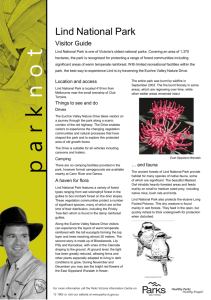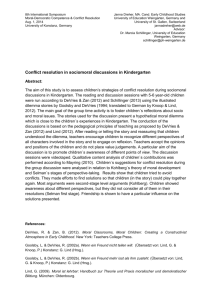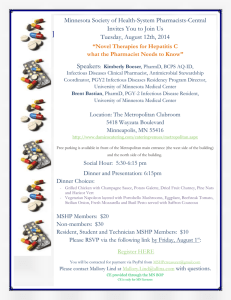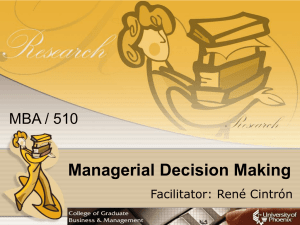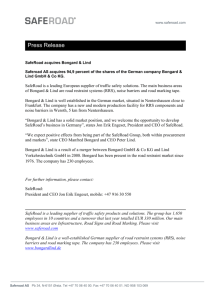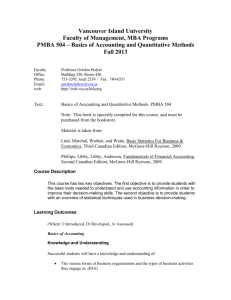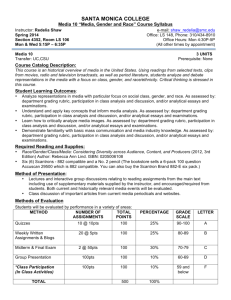Course Description - Faculty of Economics
advertisement
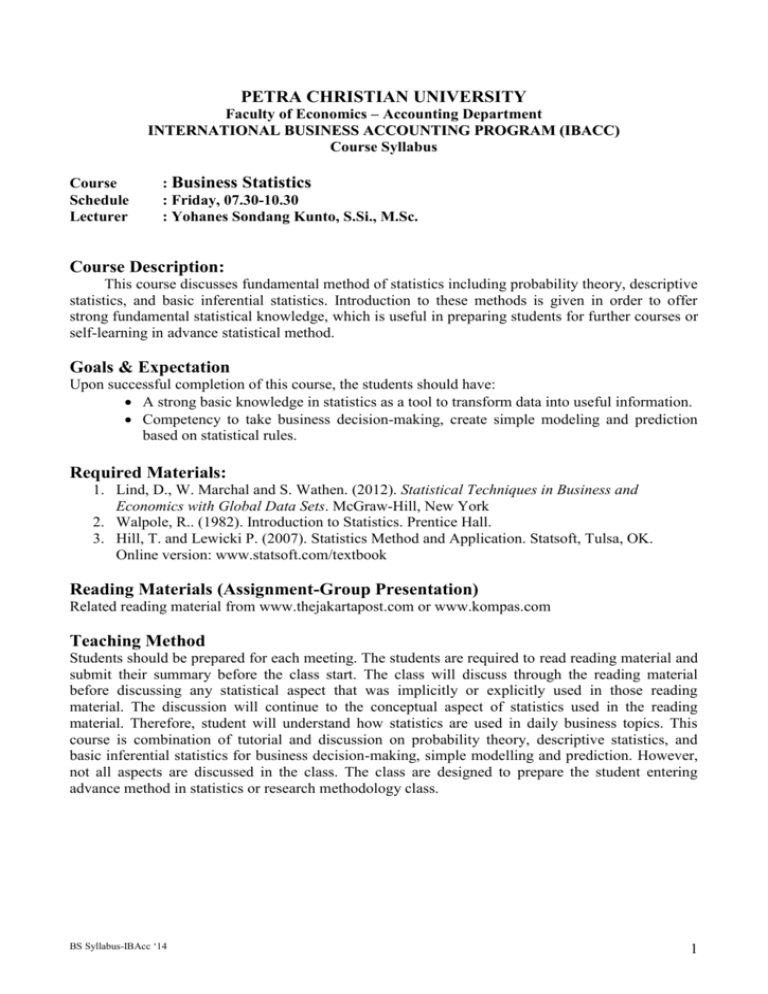
PETRA CHRISTIAN UNIVERSITY Faculty of Economics – Accounting Department INTERNATIONAL BUSINESS ACCOUNTING PROGRAM (IBACC) Course Syllabus Course Schedule Lecturer : Business Statistics : Friday, 07.30-10.30 : Yohanes Sondang Kunto, S.Si., M.Sc. Course Description: This course discusses fundamental method of statistics including probability theory, descriptive statistics, and basic inferential statistics. Introduction to these methods is given in order to offer strong fundamental statistical knowledge, which is useful in preparing students for further courses or self-learning in advance statistical method. Goals & Expectation Upon successful completion of this course, the students should have: A strong basic knowledge in statistics as a tool to transform data into useful information. Competency to take business decision-making, create simple modeling and prediction based on statistical rules. Required Materials: 1. Lind, D., W. Marchal and S. Wathen. (2012). Statistical Techniques in Business and Economics with Global Data Sets. McGraw-Hill, New York 2. Walpole, R.. (1982). Introduction to Statistics. Prentice Hall. 3. Hill, T. and Lewicki P. (2007). Statistics Method and Application. Statsoft, Tulsa, OK. Online version: www.statsoft.com/textbook Reading Materials (Assignment-Group Presentation) Related reading material from www.thejakartapost.com or www.kompas.com Teaching Method Students should be prepared for each meeting. The students are required to read reading material and submit their summary before the class start. The class will discuss through the reading material before discussing any statistical aspect that was implicitly or explicitly used in those reading material. The discussion will continue to the conceptual aspect of statistics used in the reading material. Therefore, student will understand how statistics are used in daily business topics. This course is combination of tutorial and discussion on probability theory, descriptive statistics, and basic inferential statistics for business decision-making, simple modelling and prediction. However, not all aspects are discussed in the class. The class are designed to prepare the student entering advance method in statistics or research methodology class. BS Syllabus-IBAcc ‘14 1 Grading Components No 1 2 3 4 Component Group Assignment Mini Test Mid Test Final Test Weight 25% 25% 25% 25% Read the chapter, submit the summary The understanding of the theories must be reflected in the accurate calculations The understanding, the process and the result are very important Range 86-100 76-85 69-75 61-68 56-60 41-55 0-40 Grade A B+ B C+ C D E In Group Assignment, student should work in group of maximum 4 persons. Students are asked to submit their written review in selected statistical topic from Lind et al (2008) and also presenting their review in class. Written review should be submitted 3 days before the presentation schedule. Grades of group assignment will be based on quality of writing (60%), quality of presentation (40%). In Mini Test, student should work individually in essay test format based on material in Chapter 10. This mini test will assess students thinking framework of basic hypothesis formulation and basic hypothesis testing in details. In Mid Test and Final Test, student should work individually in multiple choices format test based on previous material before (Mid Test) and after middle period (Final Test). Multiple choices format is selected to ensure objectivity grading for every student. Mid Test and Final Test is closed book. Students are allowed to use scientific calculator and handwritten formula notes. Specific Rules 1. Before the class start, students are required to submit chapter summary of the topic that would be discussed in the class. Student that did not submit their chapter summary without any reasonable reason will not be allowed attending the class. 2. Be ready for the class; bring your calculator, and statistical table. 3. Lateness will result the not-present status on the attendance list. 4. Unable to follow 75% of the scheduled class meeting will cause failure to join the final exam. 5. Get the permission from the lecturer to go in and out the classroom! 6. Approval for skipping the class or exam must be from the DEAN. 7. Lateness in submitting the assignment will not be graded. 8. Any other rules must refer to Student guidebook and IBAcc Additional Rules. Class Schedule Week Date I Feb 21st II Feb 28th III Mar 7th IV Mar 14th V Mar 21st VI Mar 28th BS Syllabus-IBAcc ‘14 Topics Descriptive Statistics: center of measurement, dispersion of measurement Descriptive Statistics: data frequency Fundamental Probability Theory, Conditional Probability, Bayes Theorem Sample and Population Concepts: expected value, variance, and covariance Discrete Theoretical Distribution: binominal, hypergeometry, and poisson. Continues Theoretical Distribution: normal, z-value, standardize normal distribution, reading continues theoretical distribution Reading Walpole ch. 1 & 2 Walpole ch. 2 Lind et al. ch. 5 Lind et al. ch. 8 Lind et al. ch. 6 Lind et al. ch. 7 2 Apr 4 table. One population confidence interval: z, t, and proportion Lind et al. ch. 9 VIII Apr 25th MIDTERM EXAM On classroom exam – Closed book Two population confidence interval: z, t, and proportion IX May 2nd Lind et al. ch. 9 Lind et al. ch. 10 Lind et al. ch. 10 Lind et al. ch. 11 Hill and Lewicki Lind et al. ch. 9, 10, 11 Hill and Lewicki Lind et al. ch. 12 & 13 Lind et al. VII th May 9th X May 16th XI May 23rd Hypothesis concepts, hypothesis test for one population: z, t, and proportion. Mini Test Hypothesis test for two or more population: z, t, proportion, chisquare. Introduction to SPSS Hypothesis testing using SPSS, Correlation using SPSS XII XIII May 30th June 6th Simple Linear Regression using SPSS One way ANOVA Introduction to advance statistical method Group Task and Presentation - - Advance Analysis of Variance (ch. 12) Multiple Regression (ch. 14) Index Numbers (ch. 15) Time Series and Forecasting (ch. 16) Nonparametric Methods (ch. 17 & 18) Statistical Process Control and Quality Management (ch. 19) An Introduction to Decision Theory (ch. 20) FINAL EXAM On classroom exam – Closed book BS Syllabus-IBAcc ‘14 3
